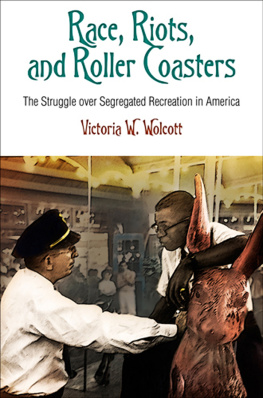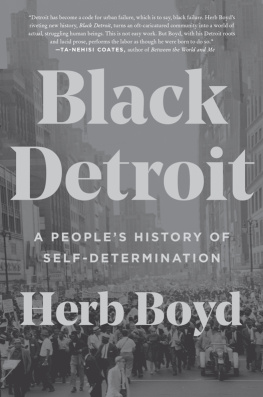Remaking Respectability
GENDER AND AMERICAN CULTURE
Coeditors
Thadious M. Davis
Linda K. Kerber
Editorial Advisory Board
Nancy Cott
Cathy N. Davidson
Jane Sherron De Hart
Sara Evans
Mary Kelley
Annette Kolodny
Wendy Martin
Nell Irvin Painter
Janice Radway
Barbara Sicherman
2001 The University of North Carolina Press
All rights reserved
Manufactured in the United States of America
Designed by Jackie Johnson
Set in Bembo
by Tseng Information Systems, Inc.
The paper in this book meets the guidelines for permanence and durability of the Committee on Production Guidelines for Book Longevity of the Council on Library Resources.
Elegies for Paradise Valley, by Frederick Glaysher, editor. 1978 by Robert Hayden, from Collected Poems of Robert Hayden, by Robert Hayden, edited by Frederick Glaysher. Used by permission of Liveright Publishing Corporation.
Portions of this book have been reprinted in revised form with permission from the following works: Mediums, Messages, and Lucky Numbers: African-American Female Spiritualists and Numbers Runners in Inter-War Detroit, in The Geography of Identity, edited by Patricia Yeager, 273306 (Ann Arbor: University of Michigan Press, 1996); Bible, Bath, and Broom: Nannie Helen Burroughss National Training School and African-American Racial Uplift, Journal of Womens History 9 (Spring 1997): 89110; and The Culture of the Informal Economy: Numbers Runners in Inter-War Black Detroit, Radical History Review 69 (Fall 1997): 4675.
Publication of this work was aided by a generous grant from the Z. Smith Reynolds Foundation.
Library of Congress Cataloging-in-Publication Data
Wolcott, Victoria W.
Remaking respectability : African American women in interwar
Detroit / by Victoria W. Wolcott.
p. cm. (Gender and American culture)
Includes bibliographical references and index.
ISBN 0-8078-2637-5 (alk. paper) ISBN 0-8078-4966-9 (pbk. : alk. paper)
1. African American womenMichiganDetroitSocial conditions
20th century. 2. African American womenMichiganDetroit
Economic conditions20th century. 3. Social classesMichigan
DetroitHistory20th century. 4. African AmericansMichigan
DetroitSocial conditions20th century. 5. African Americans
MichiganDetroitEconomic conditions20th century. 6. African
AmericansMigrationsHistory20th century. 7. Rural-urban
migrationUnited StatesHistory20th century. 8. Detroit (Mich.)
Race relations. 9. Detroit (Mich.)Social conditions 20th century.
I. Title. II. Gender & American culture
F574.D49 N488 2001
305.48896073077434dc21 2001018125
05 04 03 02 01 5 4 3 2 1
For Erik, Nora, and Maya
Contents
Illustrations
Illustration from Elias M. Woods, The Negro in Etiquette: A Novelty (1899)
Illustrations from a brochure of the Detroit Urban League, 1918
The popular Detroit Urban League baby clinic
YWCA camp on the Belle River
The Second Baptist Church congregants
A depression household
Mapping of commercial recreation in the Alfred District, 1934
Photograph of a mother sick in bed
Practicing serving
Learning how to use a washing machine
Acknowledgments
Many institutions and individuals supported me as I researched and wrote this book. In the early stages of work, I was fortunate to receive the Henry J. Kaiser Family Foundation Research Grant from the Archives of Labor and Urban Affairs, Wayne State University; a graduate student award from the Coordinating Committee on Women in the Historical Profession, Conference Group on Womens History; a research grant from the University of Michigans Center for Afroamerican and African Studies Ford Foundation project, From Margin to Center: Towards a New Black Scholarship; and the Charlotte W. Newcombe Doctoral Dissertation Fellowship. My year as a resident graduate fellow at the University of Michigans Institute for the Humanities was a crucial one, and I thank the faculty, graduate students, and staff of the institute for their valuable input and help. A postdoctoral fellowship at the University of Rochesters Frederick Douglass Institute for African and African-American Studies provided a collegial and supportive atmosphere in which to rework the manuscript. I am particularly grateful to Joseph Inikori and Karen Ferguson for their comments on my work during my tenure there.
A number of scholars read all or part of the manuscript and offered valuable advice and guidance. The distinguished members of my dissertation committeeEarl Lewis, Elsa Barkley Brown, Robin D. G. Kelley, and David Scobeywere valuable critics and model scholars. They offered me intellectual and emotional support when it was most needed. Stephanie Shaw made insightful and perceptive suggestions as an outside reader for the University of North Carolina Press and a commentator on a 1999 American Historical Association panel. Nell Irvin Painters reading of the manuscript for the University of North Carolina Press proved invaluable. I am also grateful to an anonymous reader for his or her criticisms. My editor, Kate Douglas Torrey, helped shepherd me through the publishing process with a minimum of hassle. Paula Walds editing of the manuscript was masterful. Friends and fellow historians Robin Bachin and Georgina Hickey carried me through the highs and lows of writing a book. Finally, my colleagues at St. Bonaventure University were more than supportive as I completed the manuscript while starting a demanding new teaching career.
The staffs at the Bentley Historical Library, Archives of Labor and Urban Affairs, and Burton Historical Collection helped me discover an untapped wealth of material on Detroits black women. I am also indebted to Thomas Featherstone at the Archives of Labor and Urban Affairs, Karina McDaniel at the Tennessee State Library and Archives, and Paul Spaeth and Theresa Shaffer at St. Bonaventure University Library for assistance in obtaining illustrations for the book.
I owe thanks as well to all four of my parentsNancy, Jeff, Ilene, and Peterand to my siblingsJoel, Jennie, and Lauren. In the last three years, I gave birth to Nora and Maya, who kept me grounded as I struggled to develop and teach new courses and polish the manuscript. Balancing parenthood, teaching, and research would have been an impossible task without my husband, Erik Seeman. Erik read and commented on the entire manuscript throughout the process of researching, writing, and revising. He also cared for Nora, Maya, and our home as an equal partner, ever sensitive to my need to finish the manuscript in a timely manner. Our family has brought me immense joy, and this book is dedicated to them and to us.
Abbreviations
The following abbreviations are used throughout the book. An additional list of abbreviations precedes the notes.
AMEAfrican Methodist EpiscopalCASChildrens Aid SocietyCIOCongress of Industrial OrganizationsCRCCivic Rights CommitteeMUCMayors Unemployment CommitteeNAACPNational Association for the Advancement of Colored PeopleNACWNational Association of Colored WomenNNCNational Negro CongressNYANational Youth AdministrationTOBATheater Owners Booking AssociationUAWUnited Auto WorkersUNIAUniversal Negro Improvement AssociationVHAVisiting Housekeepers AssociationVNAVisiting Nurses AssociationWPAWorks Progress AdministrationYMCAYoung Mens Christian AssociationYNPAYoung Negroes Progressive AssociationYWCAYoung Womens Christian Association
Remaking Respectability
Introduction
And Belle the classy dresser, where is she,







